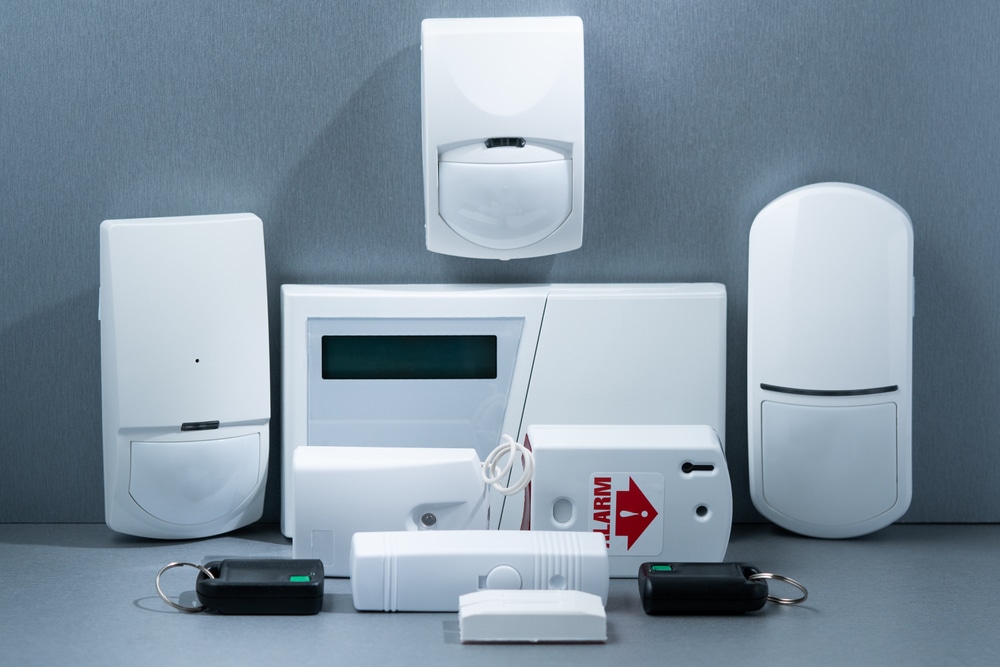Article At A Glance
- Wired alarm systems are reliable and have a hardwired connection for less interference.
- Wireless alarm systems offer convenience, flexibility, and remote control through mobile devices.
- Unmonitored alarm systems are low-cost and DIY but may have slower response times in emergencies.
- Monitored alarm systems have 24/7 professional surveillance for rapid response to emergencies.
Ensuring your home or business is secure is more crucial than ever. Choosing the right alarm system can give you peace of mind, knowing your property is protected from theft, fire, carbon monoxide, and other dangers. But with so many types of alarm systems on the market, deciding which is best for your specific needs can be overwhelming. This guide will walk you through the different types of alarm systems and their benefits to help you make an informed decision.
What Are the Types of Alarm Systems?
Alarm systems come in various forms, each designed to address different levels of security concerns. They can range from simple door alarms to sophisticated surveillance systems. Whether you seek a basic burglar alarm or a comprehensive system with multiple sensors and round-the-clock monitoring, it’s crucial to understand their differences.
Wired Alarm Systems: A Traditional, Reliable Security Solution
Wired alarm systems have been the standard for decades and are known for their reliability. These systems connect sensors, control panels, and other components via physical wires running throughout the property. Because they don’t rely on wireless signals, wired systems are less prone to interference or hacking attempts.
While wired systems are often more challenging to install, especially in an existing home, their durability and consistent performance make them a top choice for long-term use. Many property owners appreciate the stability of a hardwired connection, reducing the chances of false alarms caused by signal disruptions.
For those needing professional installation, having a wired system professionally set up ensures that every wire and sensor is correctly placed for optimal security.
Modern Convenience and Enhanced Security with Wireless Alarm Systems
Wireless alarm systems offer a modern, hassle-free alternative to wired systems. These systems use radio frequency signals to communicate between devices, eliminating the need for invasive wiring throughout your property. Wireless systems are much easier to install, making them popular for homeowners who prefer a DIY installation.
Another advantage of wireless advanced systems is their flexibility. Since they don’t require a permanent setup, they can easily expand with additional sensors or smart devices. For example, adding motion detectors, window sensors, or even a video doorbell can be done quickly and without professional help.
Many wireless systems come with mobile access, allowing you to control the system via a smartphone or tablet. This feature gives you real-time control and updates, whether at home or away, providing an extra layer of security for your property.
Additional Read: 7 Signs It’s Time for an Access Control System in Your Business
Unmonitored Alarm Systems: A DIY Approach to Home Security
Unmonitored alarm systems are often preferred by those looking for a low-cost, DIY solution. When an alarm is triggered, it will sound off on the property but won’t automatically notify emergency services. It’s up to you or a neighbor to hear the alarm and take action.
While unmonitored systems don’t offer the same level of immediate protection as monitored ones, they are still a deterrent for burglars. Some systems even integrate with smart home devices like security or doorbell cameras, giving you control through your mobile device.
Unmonitored systems offer flexibility and affordability for homeowners who want control without paying monthly monitoring fees. However, if a break-in occurs while you’re not nearby, the response time may be slower than with a monitored alarm system.
Monitored Alarm Systems: 24/7 Professional Surveillance
If you want the highest level of protection, a monitored alarm system is the way to go. These systems are connected to a central monitoring station that tracks any triggered alarm. If there’s an emergency, whether it’s a break-in, fire, or carbon monoxide leak, the monitoring company contacts you and, if necessary, dispatches emergency services to your property.
Monitored systems provide more peace of mind than unmonitored options because they ensure a rapid response, regardless of whether you’re home. Plus, monitoring makes you less likely to miss an event, even if you’re on vacation or asleep.
Although professional monitoring often comes with a monthly fee, the added security and fast response times are worth it for many homeowners and business owners.
Carbon Monoxide Alarm Systems: Detecting Dangerous Gas Leaks
While securing your property from burglars is important, safety threats such as carbon monoxide (CO) leaks can be even more dangerous. Carbon monoxide detectors are crucial to any alarm system, especially for homes with gas appliances or fireplaces. CO is a colorless, odorless gas that can be fatal if not detected early, making CO detectors essential.
A carbon monoxide alarm system continuously monitors your home’s air quality and triggers an alarm if dangerous levels of CO are detected. Some systems also integrate with your home’s other security components, providing a comprehensive solution for fire, CO, and break-in threats.
Burglar Alarm Systems: Deterrence and Protection for Your Home
A burglar alarm system is designed to protect your home from intrusions. These systems monitor entry points using various sensors, including motion sensors, door sensors, and glass break detectors. When an unauthorized access attempt is detected, the alarm sounds, and in the case of monitored systems, alerts are sent to both the homeowner and the monitoring company.
A burglar alarm system alone can deter potential intruders, significantly reducing the likelihood of a break-in. Many insurance companies even offer discounts on premiums for homes with burglar alarms installed.
Additional Read: The Top Benefits Of Alarm Installation
Fire Alarms: Early Detection and Rapid Response
Fire alarms are another essential component of a home security system. Smoke detectors provide early warnings in a fire, allowing you to evacuate and call for help before the situation escalates, though they can sometimes trigger false alarms. Modern systems also include heat detectors and fire alarms, which can automatically contact emergency services when triggered, ensuring rapid response.
Some systems even have cellular backups to ensure alarms are sent out, even if the power or phone line is down. This feature is particularly useful during emergencies when every second counts.
Enhance Your Alarm Systems with Stark Security
No matter the type of alarm system you choose, Stark Security is here to help you with expert alarm system installation and repair. Our team is well-versed in wired and wireless alarm systems and surveillance cameras, providing tailored solutions for both residential properties and businesses.
We understand the importance of reliable monitoring services, and we offer options for 24/7 professional monitoring to give you total peace of mind. Whether you need to upgrade your existing system, add additional security cameras, or integrate smart devices like Google Nest into your security setup, we’ve got you covered.
Ready to upgrade your alarm systems? Call our security professional today at (773) 455-1220 to discuss your security needs.














